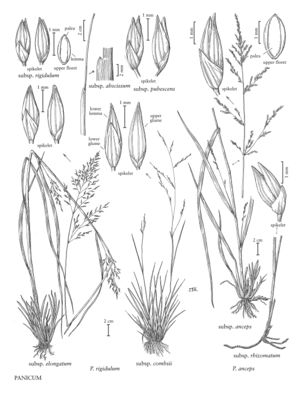familyPoaceae
subfamilyPoaceae subfam. Panicoideae
genusPanicum
subgenusPanicum subg. Agrostoidea
sectionPanicum sect. Agrostoidea
speciesPanicum rigidulum
subspeciesPanicum rigidulum subsp. elongatum
Difference between revisions of "Panicum rigidulum subsp. elongatum"
Synonyms: Panicum stipitatum unknown
Treatment appears in FNA Volume 25. Treatment on page 478.
FNA>Volume Importer |
FNA>Volume Importer |
||
| Line 15: | Line 15: | ||
}}<!-- | }}<!-- | ||
| − | --><span class="statement" id="st-undefined" data-properties=""><b>Plants </b>similar to | + | --><span class="statement" id="st-undefined" data-properties=""><b>Plants </b>similar to subsp. rigidulum, but more conspicuously purple-tinged throughout, especially the panicles. <b>Ligules</b> 0.3-1 mm, membranous; blades usually 5-12 mm wide, flat, mostly glabrous or scabridulous, bases about equal in width to the subtending sheaths. <b>Panicles</b> relatively narrow; branches few, stiffly ascending. <b>Spikelets</b> 2.4-3 mm long, usually less than 0.6 mm wide, conspicuously stipitate, purple, often falcate, subsecund along the branchlets. <b>Upper</b> florets stipitate, stipes to 0.4 mm, slender.</span><!-- |
-->{{Treatment/Body | -->{{Treatment/Body | ||
| − | |discussion=<p | + | |discussion=<p>Panicum rigidulum subsp. elongatum is most common in the piedmont and mountain regions of the eastern United States.</p> |
|tables= | |tables= | ||
|references= | |references= | ||
| Line 34: | Line 34: | ||
|basionyms= | |basionyms= | ||
|family=Poaceae | |family=Poaceae | ||
| + | |illustrator=Linda A. Vorobik and Cindy Roché | ||
|reference=None | |reference=None | ||
|publication title= | |publication title= | ||
|publication year= | |publication year= | ||
|special status= | |special status= | ||
| − | |source xml=https:// | + | |source xml=https://bibilujan@bitbucket.org/aafc-mbb/fna-data-curation.git/src/314eb390f968962f596ae85f506b4b3db8683b1b/coarse_grained_fna_xml/V25/V25_1274.xml |
|subfamily=Poaceae subfam. Panicoideae | |subfamily=Poaceae subfam. Panicoideae | ||
|tribe=Poaceae tribe Paniceae | |tribe=Poaceae tribe Paniceae | ||
Revision as of 16:14, 30 October 2019
Plants similar to subsp. rigidulum, but more conspicuously purple-tinged throughout, especially the panicles. Ligules 0.3-1 mm, membranous; blades usually 5-12 mm wide, flat, mostly glabrous or scabridulous, bases about equal in width to the subtending sheaths. Panicles relatively narrow; branches few, stiffly ascending. Spikelets 2.4-3 mm long, usually less than 0.6 mm wide, conspicuously stipitate, purple, often falcate, subsecund along the branchlets. Upper florets stipitate, stipes to 0.4 mm, slender.
Discussion
Panicum rigidulum subsp. elongatum is most common in the piedmont and mountain regions of the eastern United States.
Selected References
None.
Lower Taxa
None.
... more about "Panicum rigidulum subsp. elongatum"
Conn. +, N.J. +, N.Y. +, W.Va. +, Del. +, D.C. +, Wis. +, B.C. +, N.S. +, Ont. +, Mass. +, Maine +, N.H. +, R.I. +, Vt. +, Fla. +, Ala. +, Kans. +, Ky. +, La. +, Mo. +, Okla. +, Pa. +, Tenn. +, Tex. +, Va. +, Puerto Rico +, N.C. +, S.C. +, Md. +, Calif. +, Miss. +, Ark. +, Ill. +, Ga. +, Ind. +, Mich. +, Ohio + and Oreg. +
Present +
Panicum rigidulum subsp. elongatum +
Panicum rigidulum +
subspecies +
